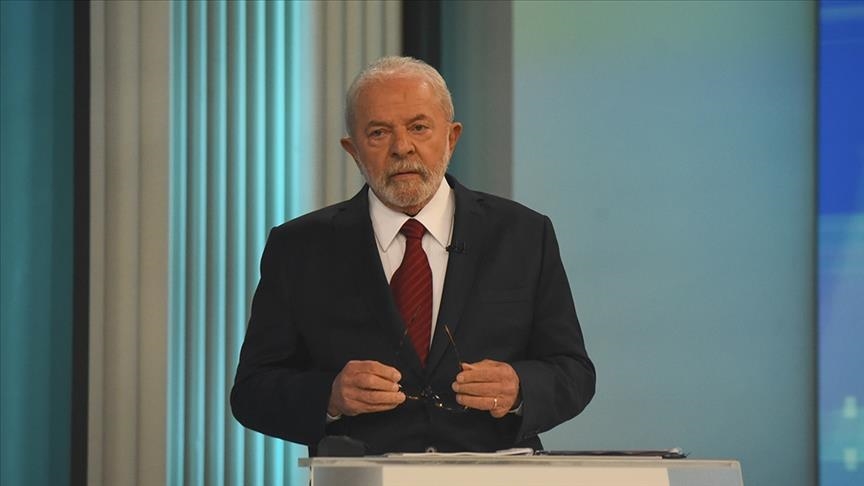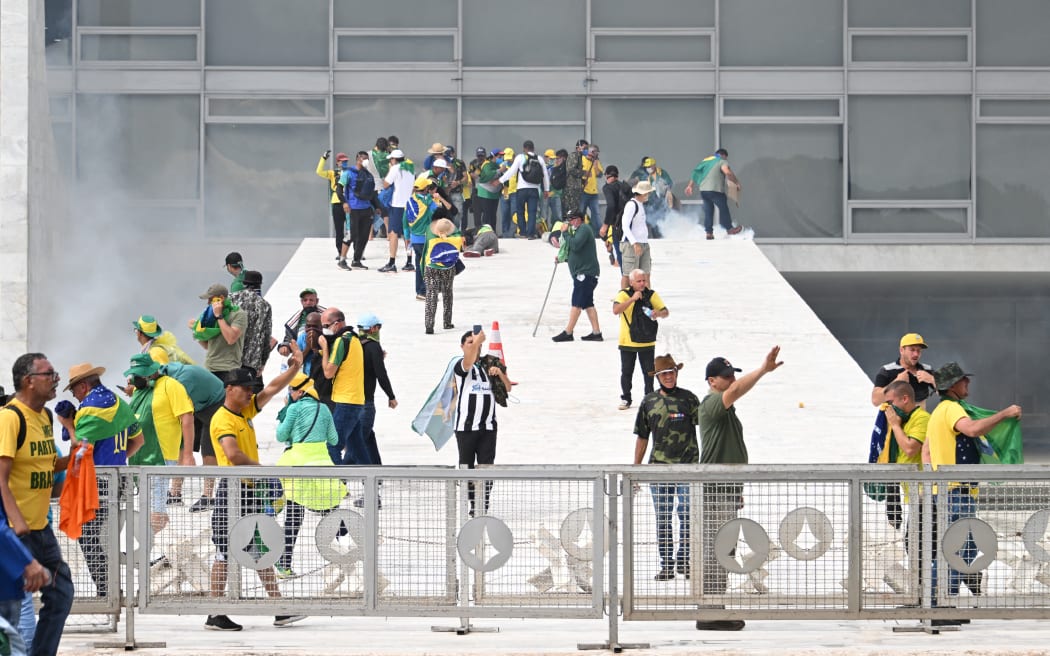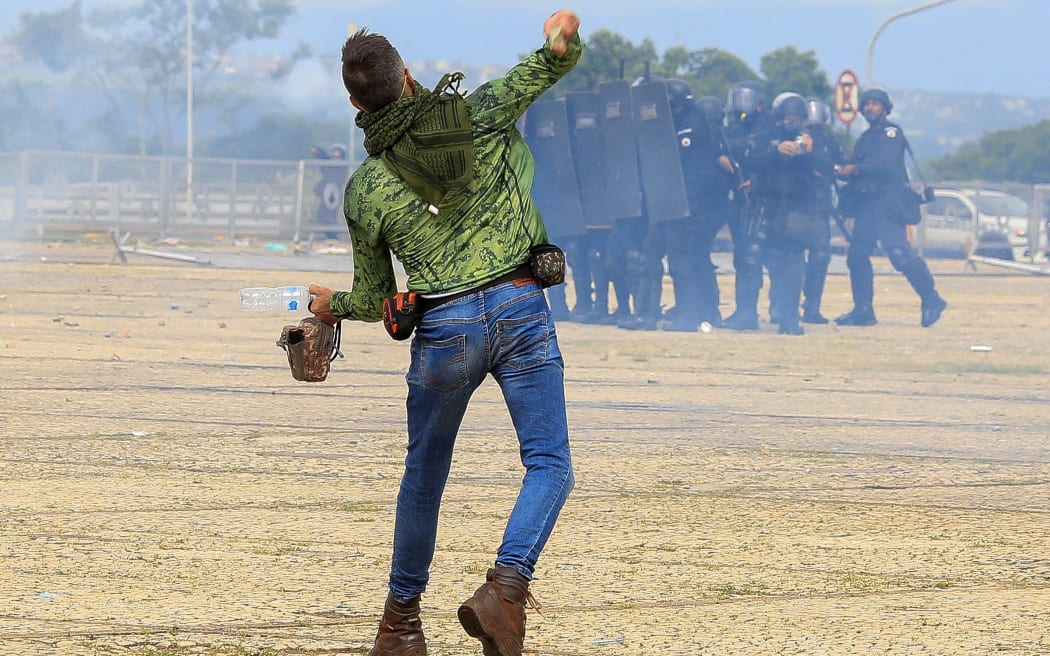January 08, 2023

Images and videos shared on social media showed Bolsonaro supporters reportedly ransacking Brazil's National Congress building, Supreme Court and the presidential palace.
Brazilian police used tear gas Sunday to try to repel hundreds of supporters of far-right ex-president Jair Bolsonaro after they stormed onto Congress grounds one week after President Luis Inacio Lula da Silva's inauguration, an AFP photographer witnessed.
The area around the parliament building in Brasilia had been cordoned off by authorities, but Bolsonaro backers who refuse to accept leftist Lula's election victory broke through, marched up ramps and gathered on a roof of the modernist building.
Members of former President Donald Trump's MAGA movement have been largely supportive of Bolsonaro's bid to overturn the country's election.
with AFP.
Researchers detected a surge in agressive rhetoric from election denialists in far-right channels online ahead of Sunday’s rioting
By Elizabeth Dwoskin
Updated January 8, 2023
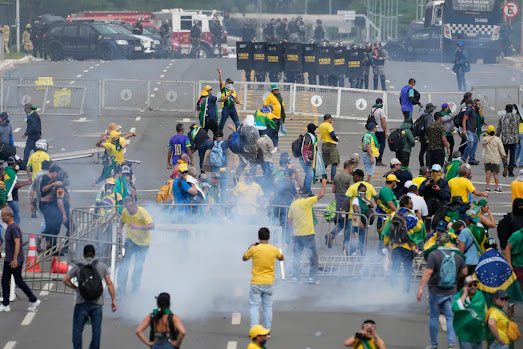
In the weeks leading up to Sunday’s violent attacks on Brazil’s congress,, and other government buildings, the country’s social media channels surged with calls to attack gas stations, refineries, and other infrastructure, as well as for people to come to a “war cry party in the capital,” according to Brazilian social media researchers.
Online influencers who deny the results of the country’s recent presidential election used a particular phrasing to summon “patriots” to what they called a “Festa da Selma” — tweaking the word “selva,” a military term for war cry, by substituting an “m” for the “v” in hopes of avoiding detection from Brazilian authorities, who have wide latitude to arrest people for “anti-democratic” postings online. “Festa” is the Portuguese word for “party.”
That online activism culminated in busloads of people landing in the capital on Sunday, where they stormed and vandalized three major government buildings, reportedly setting fires and stealing weapons in the most significant assault on the country’s democratic institutions since the country’s 1964 military coup.
Brazilian analysts have long warned of the risk in Brazil of an incident akin to the Jan. 6, 2021, insurrection at the U.S. Capitol. In the months and weeks leading up to the country’s presidential election in October — in which leftist Luiz Inácio Lula da Silva defeated the right-wing incumbent, Jair Bolsonaro — social media channels were flooded with disinformation, along with calls in Portuguese to “Stop the Steal,” and cries for a military coup should Bolsonaro lose the election.
On TikTok, researchers found that five out of eight of the top search results for the keyword “ballots” were for terms such as “rigged ballots” and “ballots being manipulated.” At the same time, Facebook and Instagram directed thousands of users who plugged in basic search terms about the election toward groups questioning the integrity of the vote. On Telegram, an organizing hub for Brazil’s far-right, a viral video taken down by authorities called for the murder of children of leftist Lula supporters.
How Facebook and TikTok are helping push Stop the Steal in Brazil
In the days following the final election tally on Oct. 30, Bolsonaro supporters who rejected the results blocked major highways across the country. These blockades morphed into demonstrations in dozens of cities, where supporters camped out in front of military bases for weeks. Some of them held signs saying “Stolen Election” in English, a testament to the close ties between right wing movements in both countries.
Though Lula’s inauguration last week took place largely without incident, calls for violence and destruction have accelerated online in recent weeks, said researcher Michele Prado, an independent analyst who studies digital movements and the Brazilian far-right.
“For years now, our country has been going through a very strong process of radicalizing people to extremist views — principally online,” she said. “But in the last two weeks, I’ve seen ever-growing calls from people incentivizing extremism and calling for direct action to dismantle public infrastructure. Basically, people are saying we need to stop the country in its tracks and generate chaos.”
Posts demanding a coup, along with common pro-Bolsonaro hashtags claiming “election fraud,” and “stolen election,” have circulated on all social media services. The most violent rhetoric as well as the most direct organizing has taken place on the largely un-moderated messaging service Telegram.
Researchers in Brazil said Twitter in particular was a place to watch because it is heavily used by a circle of right wing influencers — Bolsonaro allies who continue to promote election fraud narratives. Several of these influencers have had their accounts banned in Brazil and now reside in the United States. Bolsonaro himself was on vacation in Florida on Sunday.
Billionaire Elon Musk, who completed his acquisition of Twitter in late October, fired the company’s entire staff in Brazil except for a few salespeople, said a person familiar with the firings who spoke on the condition of anonymity to describe sensitive matters. Among those fired in early November included eight people, based in Sao Paulo, who moderated content on the platform to catch posts that broke its rules against incitement to violence and misinformation, the person said. The person said they were not aware of any teams actively moderating rule-breaking content on Twitter in Brazil.
Criticism specifically targeting Alexandre de Moraes, a judge at the Superior Electoral Court and the Supreme Federal Court who is despised by Bolsonaro supporters because he has blocked many prominent right wing leaders from posting online, have also stepped up since the election, Prado and others said.
Footage circulating on social media from Sunday’s demonstration showed rioters pulling a chair from a government building, upon which they placed the seal of the Brazilian republic. One rioter shouted, “Look everyone, it’s Big Alexander’s chair!,” using a derogatory nickname for Moraes. Expletives followed, according to the video. It could not be confirmed if the chair had actually been taken from Moraes’ chambers.
Despite their seeming similarities, Brazilian researchers said that Bolsonaro supporters are careful not to draw too many comparisons to Jan. 6 in the U.S. because doing so could trigger arrest for inciting anti-democratic acts, a crime in Brazil. If Jan. 6 is referenced, as it was in a handful of posts this week, the utterances appear in code, said Viktor Chagas, a professor at Fluminense Federal University in Rio de Janeiro state who researches online far-right movements.
Still, Chagas said Sunday’s riot was “a clear attempt to emulate the invasion of the U.S. Capitol, as a reproduction of Trumpist movements and a symbolic signal of strength and transnational connections from the global far-right.”
Chagas noted that Jan. 9 is an important nationalist symbol in Brazil, marking the day the country’s first ruler, Emperor Dom Pedro I, declared that he would not return to Portugal, in what is popularly known as “I Will Stay” Day.
“It is as if Bolsonarists were equating Bolsonaro with D. Pedro I, and indicating that the former government will remain,” he said. Some posts have also referenced “I will stay day,” indicating that the demonstrations would likely continue through Monday, he added.
In a tweet on Sunday, Bolsonaro — a prolific social media user who has been relatively quiet since his election defeat — denounced the attacks: “Peaceful demonstrations, by law, are part of democracy,” he tweeted, hours after the assault began. “However, depredations and invasions of public buildings as occurred today, as well as those practiced by the left in 2013 and 2017, were outside of the law.”
Brazilian researchers said that among Bolsonaro supporters, a counter-narrative had already begun to circulate on Sunday, blaming the Lula government and people from Lula’s party for infiltrating peaceful, democratic demonstrations to turn the country against supporters of Bolsonaro. The counter-narrative also had echoes of the Jan. 6 insurrection, in which many Trump supporters blamed left wing activists for the violence.
The mayhem on Sunday was “a disaster,” said Paulo Figueiredo Filho, a presenter for the right-wing channel Jovem Pan who lives in Florida and has had his social media accounts canceled by Moraes. “It is Moraes’ wet dream.”

By Elizabeth Dwoskin
CGTN
Brazil's Supreme Court Justice Alexandre de Moraes ruled that Brasilia Governor Ibaneis Rocha, a longtime ally of former President Jair Bolsonaro, to be removed from position for 90 days after invasion in capital on Sunday, according to local media.
More than 400 participants in riots detained in Brasilia

TEHRAN, Jan. 09 (MNA) – More than 400 people were detained on Sunday for participating in riots in the Brazilian capital, Federal District Governor Ibaneis Rocha wrote on Twitter.
"I inform you that more than 400 people have already been arrested and will pay for the crimes committed. We continue working to identify all the others who participated in these terrorist acts this afternoon in the Federal District. We continue to work to restore order," he wrote on Twitter.
Earlier, the Governor published a video message in which he asked President Luiz Inacio Lula da Silva to forgive him, as well as the heads of the legislative and judicial authorities of the country for the riots perpetrated by supporters of ex-President Jair Bolsonaro, TASS reported.
On Sunday, the supporters of Bolsonaro clashed with police in the country's capital and broke into the National Congress (Parliament) and other state institutions. The few security guards at the empty sites on Sunday were unable to rebuff the protesters who did not recognize the results of the October presidential election.
According to preliminary estimates, about 5,000 people participated in the riots. To disperse the demonstrators, the security forces used smoke bombs and tear gas grenades, including dropping them from a helicopter. Law enforcement officers are successfully regaining control over the buildings attacked by vandals, the detainees are sent to police stations. There have been no official reports of possible casualties yet.
Socialist Lula da Silva took office as President of Brazil on January 1, defeating Bolsonaro in the second round of elections. The gap between them was 2.1 million votes. The conservative did not admit defeat, and his supporters massively took to the streets and to the garrisons of the armed forces demanding that Lula da Silva not take office. At the end of December 2022, Bolsonaro left for the United States.
MNA/PR
Videos: When Jair Bolsonaro protesters
attacked Brazil's government buildings
Jair Bolsonaro: Crowds were seen entering the Brazilian congress and other branches of government.
Breaking through security barriers in the capital of Brazil, supporters of former president Jair Bolsonaro broke invaded Congress, the supreme court and the presidential palace as seen in videos widely shared on social media. The attack took place when Brazil's current president Luiz Inacio Lula da Silva wasn’t in the palace, AFP reported adding that the police used pepper spray to control the protesters.
In an event similar to the January 6, 2021, invasion of the US Capitol, crowds were seen entering the Brazilian congress and other branches of government.
Jair Bolsonaro's supporters have long disputed the result of the October election in which leftist Luiz Inacio Lula da Silva beat Bolsonaro. Even the former president has repeatedly questioned, without evidence, the credibility of the country's voting system.
Bolsonaro supporters invade Brazil's Congress, Supreme Court in Brasilia
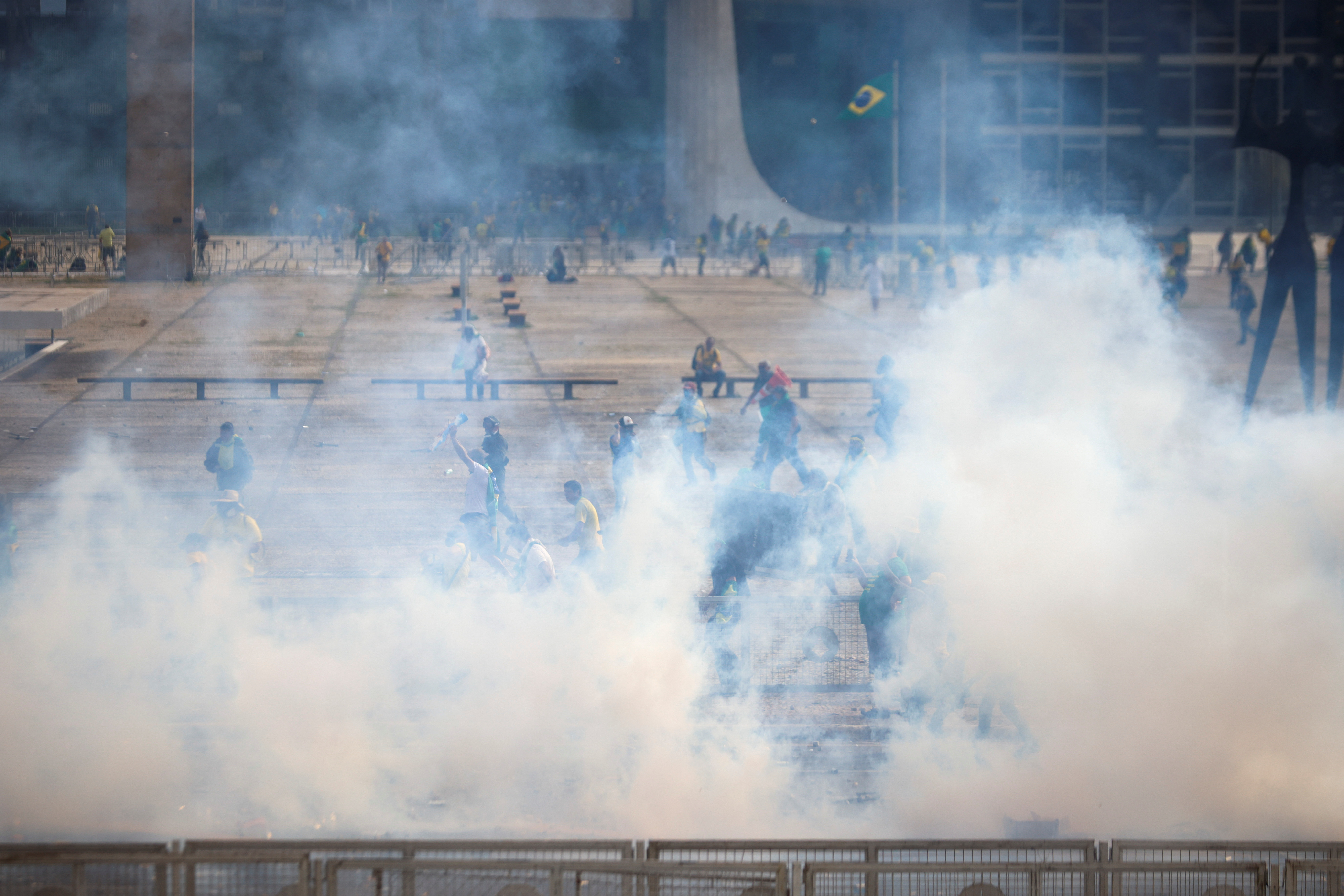
BRASILIA, Jan 8 (Reuters) - Supporters of Brazil's former far-right
President Jair Bolsonaro on Sunday invaded the Supreme Court,
the Congress building and surrounded the presidential palace in
Brasilia, according to television images.

